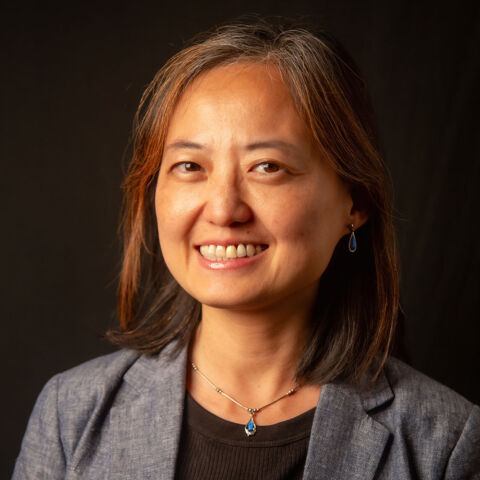Chingwen Cheng
- Stuckeman School Director
- Professor of Landscape Architecture
121 Stuckeman
- Email cvc6428@psu.edu
- Phone 814-863-8133
- Vitae Download/View CV

Biography
Chingwen Cheng began her role as director of the Stuckeman School on July 1, 2023. Previously the program head and associate professor of landscape architecture, urban design, and environmental design at the Design School at Arizona State University, Cheng is a climate justice design educator and advocate for climate actions through co-designing nature-based solutions with communities.
A recipient of grants from the National Science Foundation, Wells Fargo Foundation, and others, Cheng has received more than half a million dollars in funding for her research from 2013-2023. She was twice named Landscape Architecture Foundation Case Study Investigator to document landscape performances in sustainability outcomes. Cheng founded and directed the Hydro-GI Lab, focusing on the evaluation of both design process and outcomes of nature-based solutions for climate justice design. Her studies include evaluation of social-ecological landscape performance and investigation of sustainable and resilient urban water systems design through hydrological modeling and field experiments, as well as surveys and participatory engagement. In addition, Cheng integrated theories in social vulnerability and environmental justice to create the “Climate Justicescape” assessment framework, which identifies priorities for green infrastructure investment in communities.
Cheng has collaborated across disciplines to assess the state of knowledge in green infrastructure and stormwater control measures, and to determine the sustainability outcomes and ecosystem services provided by landscapes and outdoor environments toward urban resilience. Over the last decade, she has published 19 peer-reviewed journal articles and nine book chapters, including pieces in high-impact journals such as Landscape and Urban Planning, Environmental Management, Urban Climate, Sustainability, Ecosphere, Frontiers in Water, and others.
Cheng has engaged with several research hubs and networks worldwide, including chairing the Nature-Based Solutions for Urban Resilience in the Anthropocene Design for Justice thematic working group and Association of Pacific Rim Universities (APRU) Sustainable Cities and Landscapes (SCL) Vulnerable, Resilient, and Climate Justice Communities working group, with ongoing projects on design justice theoretical frameworks. In addition, she is on the steering committee for the APRU SCL research hub. Through APRU’s partnership with several international organizations in the United Nations, Cheng chaired an urban resilience learning module in the Asia Pacific Mayors Academy targeting new mayors from less developed countries.
Cheng is a Registered Professional Landscape Architect and LEED-Accredited Professional with extensive experience integrating transdisciplinary co-design processes in watershed planning, stormwater management, low-impact development, and community design in the United States. She received the American Society of Landscape Architects (ASLA) Illinois Chapter Honor Award, and her students have received awards from the Arizona and Hawaii chapters. One of her studio projects received the U.S. Environmental Protection Agency RainWorks Challenge second prize. The Arizona ASLA chapter named her Educator of the Year. Cheng has been active in climate action-focused groups in ASLA at the national level, including serving on the ASLA Climate Action Plan Advisory Group and Climate Action Committee, and co-chairing the Environmental Justice Professional Practice Network.
Cheng holds a doctorate in regional planning, master of landscape architecture degree, and a bachelor of science degree in horticulture and landscape architecture.